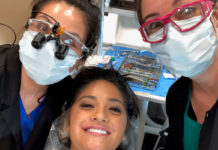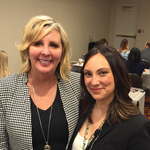
SHAPING AND POLISHING THREE ESSENTIAL SKILLS.
Every dentist remembers those first exciting moments after finishing dental school. We tossed our caps into the air, received our diplomas and embarked on a grand new adventure. After spending years preparing for our future careers and gathering the skills for a productive practice, our minds were naturally filled with dreams of greatness. We envisioned waiting rooms overflowing with patients. We visualized a staff that would run the office smoothly and efficiently. We imagined that our finances would be so fruitful that our income would far outweigh the expenses. We pictured ourselves happily working on patients with perfectly organized and productive schedules. We thought we had all the skills to make our dreams come true. After all, as dental school graduates, we were taking on the world! We were leaving dental school with a bright future—armed with a gleaming treasure chest, full of skills that would bring wealth and renown to our dental practices.
Yet for all new dentists, reality eventually sets in. The light bulb goes on and we finally understand the cold, hard truth; the skills we thought we perfected in dental school may not quite be the polished gems that we imagined. This sudden understanding often comes when dentists realize that dental school may have provided us with the basics, but creating the dental practice of our dreams may require further work and knowledge.
An Aha! Moment
I had such a moment of epiphany not long after leaving dental school. I was fortunate to begin my career as an associate dentist in an established practice. This great opportunity afforded me an onsite mentor, with whom I could ask questions and seek out advice. Yet even though my mentor was helpful, he was limited in what he could teach. And I was hungry for more! I wanted to improve my skills, so I could eventually have my own successful practice.
As an associate dentist, I knew I wasn’t going to achieve my goals trudging along with the daily routine in this office. I knew that a successful practice of my own required more work—and additional refinement of the skills I obtained in dental school. I needed some direction for advanced training, but with my limited experience, I wasn’t exactly sure where to turn.
I started exploring continuing education options. Not too long into my search, I fortuitously discovered the courses offered by the Dr. Dick Barnes Group. The classes seemed interesting and promising, so I decided to give them a try. After attending only one course, I was hooked. Over the years, I have taken every course offered by the group: clinical courses, financial courses and staff management courses. In fact, I have taken some of the courses several times. In every course, I shaped and polished my skills under the tutelage of expert mentors and teachers. And by so doing, I transformed my dream practice from aspiration to reality.
Three Essential Skills
The American philosopher Ralph Waldo Emerson defined success with an analogy of uncut diamonds. Emerson wrote, “Discard them and their value will never be known. Improve them and they will become the brightest gems in a useful life.” I took some professional skills, or what I call ‘gems’ from dental school and improved them, and my practice is evolving into the practice of my dreams. Three particular skills greatly enhanced by the Dr. Dick Barnes Group were—office management, clinical skills and knowing your numbers.
 Office Management Gem
Office Management Gem
The first course I took with the Dr. Dick Barnes Group was Tawana Coleman’s Total Team Training in 2006. I chose this particular course first because I felt that my office management skills needed to be refined. Unfortunately, dental school provided little training on the best practices of managing an office and staff, so I definitely benefitted from some instruction.
I couldn’t have asked for a better instructor on managing staff than Tawana Coleman. From the moment I sat down in her class, I felt at ease. Tawana is warm and personable, informative and inspirational, and teaches in a highly motivational style that inspires her audiences to be better and do better on both a professional and personal level.
In the two-day course, I learned a variety of new skills. First and foremost, I learned the importance of seeing and treating my employees as a team and not ‘my staff.’ I also learned that as the dentist, I am the leader of the team and therefore should lead by example to inspire the team to want to contribute to the success of the practice.
I also learned some techniques for improving my patient-relation strategies. I gained the confidence to offer patients the best possible treatment, regardless of monetary concerns. I learned that proper wording and communication is key in helping a patient to truly understand that what you’re offering them is in their best interest and not merely a sales pitch to make a dollar.
When I returned to my practice, I utilized the tools that Tawana provided me in the course, particularly the team-building activities. I wanted to help members of my team feel valued in their contributions to the practice. By so doing, I helped them understand how critical their roles were in the day-to-day success of the office. An essential element was teaching the team to utilize Tawana’s dialog when answering phone calls.
Before long, my office-management skills really took on a lustrous shine. My team consistently and persistently utilized Tawana’s techniques in order to keep our office-management skills as polished as possible. We accomplished this by meeting regularly as a team and reassessing our goals. We also attended Tawana’s course again for ‘refreshers.’ Since initially taking the course, I have sent members of my team to the Total Team Training a total of six times and plan on doing so as long as the course is offered. Each time we attend the course, we feel rejuvenated and ready to take our practice to a new level of productivity.
 Clinical Skills Gem
Clinical Skills Gem
The most common skills that dentists receive in dental school are clinical. I remember feeling fairly confident in my clinical skills when starting my practice—but I knew that there was still a great deal of refinement that needed to take place. Other types of skills were only tacitly covered in dental school. A good example was having the confidence to do dental implants.
Many dentists suppose that dental implants are typically something that only a specialist or seasoned expert would tackle. That’s exactly how I felt about dental implants shortly after graduating from dental school. Such a procedure was something that I considered possibly adding to my repertoire sometime in the future, but certainly not as a novice dentist. However, my mindset soon changed.
After such a rewarding experience at the Total Team Training, I signed up for more courses. I remember perusing through the various offerings and taking a second glance at the Implant EZ I course. Something about the course description really intrigued me. Don’t get me wrong, I still felt apprehensive about giving it a try. I honestly didn’t see myself as that kind of specialized dentist yet.
But after careful consideration, I decided that I didn’t have anything to lose by enrolling. After all, I was just taking a course. I wasn’t committing myself to anything more. At the end of the course, if I didn’t feel that it was the right time to add dental implants to my practice, I wouldn’t have to add them. So just a few short years into my practice and only two months after the Total Team Training course, I attended the Implant EZ I course.
During the course, dentists get to watch firsthand as an expert dentist performs the procedures. And this happened on the first day! This type of instruction offers the unique experience of watching a master at work and listening to the step-by-step approach that he uses each and every time he completes an implant. It was like being given an itemized checklist of how to shape and refine this important clinical skill.
The real epiphany for me was when the instructor explained this basic premise: if dentists can do extractions, they can do dental implants. It had never been explained to me like that before, and honestly, had I not witnessed the procedure firsthand using a systematic step-by-step approach, I probably wouldn’t have believed it! Learning to do implants also enhanced the skill of doing extractions into one of greater value for my patients.
Another clinical skill that I was able to polish through the courses at the Dr. Dick Barnes Group was Full Arch Reconstruction. In dental school, doing anything more than two crowns is considered extremely advanced. So the idea of completing a full arch reconstruction with a crown on every tooth is generally beyond any new dentist’s wildest imagination.
I didn’t implement full arch reconstruction immediately after the dental implant course, but it certainly would have been possible. Essentially, the Full Arch Reconstruction course is taught the same way as the Implant EZ I, with over-the-shoulder, real-life demonstrations. In addition to this effective demonstration-style of teaching, instructors also provide students with clear checklists to follow throughout the entire process, just as they do with the Implant EZ I. The checklists are extremely helpful because they outline the steps to follow before, during, and after the procedure in order to ensure a successful outcome. This literally takes all of the guesswork out of full arch reconstruction—the plan of attack, as it were—is clearly setup in a systematic fashion.
After the class was completed, I had the practical tools to implement the procedures into my practice. As with the Implant EZ I course, I left this course with a nugget of truth: if a dentist can seat a crown, there’s absolutely no reason why he or she can’t do a full arch reconstruction after receiving the proper mentorship and training.
After each course, I began to integrate elements of what I learned into my practice. I initially chose ‘ideal’ cases when applying new techniques. I didn’t want to choose the most difficult cases, as that surely would have affected my success rate.
After successfully completing my first few cases, my confidence soared and I took on additional implant cases. I received referrals from patients whose friends were impressed with my work. Such cases have been big, income-generating procedures for my office. They have affected the bottom line exponentially.
 Know Your Numbers Gem
Know Your Numbers Gem
Similarly, the financial seminars offered by the Dr. Dick Barnes Group are a crucial component to building a successful dental practice. If there’s anything significantly missing in dental school, it’s the methods of how to properly run a business. Dental school primarily focuses on the clinical aspects of dentistry. There’s very little emphasis (if any) about how to effectively manage the busi-ness aspects of a dental practice. That leaves a slew of unanswered questions: How much is does cost me to open my practice every day? How do I do payroll? How can I lower my overhead and increase my income level? Immediately after dental school, I did not know the answers to any of those questions. I felt extremely overwhelmed and inadequate in this area of my practice.
However, I obtained the skills I needed by attending the Know Your Numbers course taught by Dr. Jim Downs. During the course, I remember a significant moment when Dr. Downs explained the BAM, essentially a “Bare Amount of Money.” He analyzed all of the numbers and helped me understand what it costs to open my doors every day. When he explained the BAM, I finally got it! I knew why I had been so frustrated with my practice—I wasn’t running it as a true business. This knowledge definitely helped me reassess how to allocate my funds in order to have the successful practice that I had always envisioned.
After discussing the BAM, Dr. Downs taught methods for setting clear financial goals and how to achieve them. In other words, he taught me how to cut, shape, and polish my business skills into gems of great value. Dr. Downs’s methodology made it completely possible. I learned many things, including: the amount of money it takes to run a practice on a daily basis; how to establish production goals; how to motivate my staff; and how to successfully manage my inflow, outflow, and overall budget. By the end of the seminar, I had the skills to make a real difference in the financial aspects of my practice.
When I returned home, I strategized a plan with my team. Together, we set goals with tangible rewards, just as the course suggested. This was incredibly motivating. We realized that if we worked together, we could make this practice profitable for all of us.
By utilizing such techniques, we literally doubled our business in the first month. During the past few years, we have continued to set high goals and achieve them. It has helped our practice grow at a steady pace for the past three years.
Based on my experience, the best advice I can give any dentist, new or experienced, is to look for ways to shape and polish your skills. One of the greatest professional choices I’ve made thus far is continuing to advance my knowledge. The courses I have taken through the Dr. Dick Barnes Group have transformed my practice. I plan on a long career in dentistry and will continue to refine and polish the gems I acquired in dental school. I am already reaping the rewards of doing so—I now have a treasure chest filled with gleaming gems. For me, that brings true success in dentistry. The same can happen for you!









